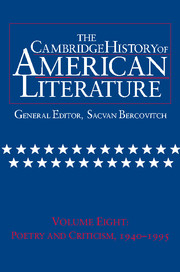Book contents
- Frontmatter
- Introduction
- Poetry, Politics, and Intellectuals
- Criticism since 1940
- Introduction
- 1 Politics and American Criticism
- 2 The Emergence of Academic Criticism
- 3 The Nationalizing of the New Criticism
- 4 The Canon, the Academy, and Gender
- 5 Deconstruction and Poststructuralism
- 6 From Textuality to Materiality
- 7 Cultural and Historical Studies
- Conclusion: Academic Criticism and its Discontents
- Appendix II: Biographies of Critics
- Chronology 1940–1995
- Bibliography
- Index
2 - The Emergence of Academic Criticism
from Criticism since 1940
Published online by Cambridge University Press: 28 March 2008
- Frontmatter
- Introduction
- Poetry, Politics, and Intellectuals
- Criticism since 1940
- Introduction
- 1 Politics and American Criticism
- 2 The Emergence of Academic Criticism
- 3 The Nationalizing of the New Criticism
- 4 The Canon, the Academy, and Gender
- 5 Deconstruction and Poststructuralism
- 6 From Textuality to Materiality
- 7 Cultural and Historical Studies
- Conclusion: Academic Criticism and its Discontents
- Appendix II: Biographies of Critics
- Chronology 1940–1995
- Bibliography
- Index
Summary
In a culture marked by rapid change, nothing changes more frequently than the past. With the growth of jet travel, the once disruptive technology of the railroad came to seem almost quaintly endearing. Similarly, intellectual revolutions have a way of making the previous revolution seem less threatening than it seemed to those who lived through it. We look back at yesterday’s shocking revolution as the good old days to which we now long to return. A case in point is the recent literary-theory revolution, which has made the critical movements of the 1940s look more innocuously “traditional” than they appeared to be when they were taking place. We can gain a perspective on the recent history of criticism, then, by considering how forms of academic criticism that may appear so conservative to us now were experienced by their contemporaries.
Such an effort is especially necessary today because the upheavals provoked by recent literary theory have changed how the history of criticism appears to us. As very different groups have reacted antagonistically to the new theories, party lines have been quietly redrawn, making unaccustomed allies of critics who once were adversaries. As our period promises or threatens to become an Age of Theory, middlebrow journalists and some disenchanted academics have discovered points of commonality not previously apparent to either group. By the same token, today’s avant-garde often fails to see how earlier movements anticipated its ideas.
- Type
- Chapter
- Information
- The Cambridge History of American Literature , pp. 281 - 304Publisher: Cambridge University PressPrint publication year: 1996



